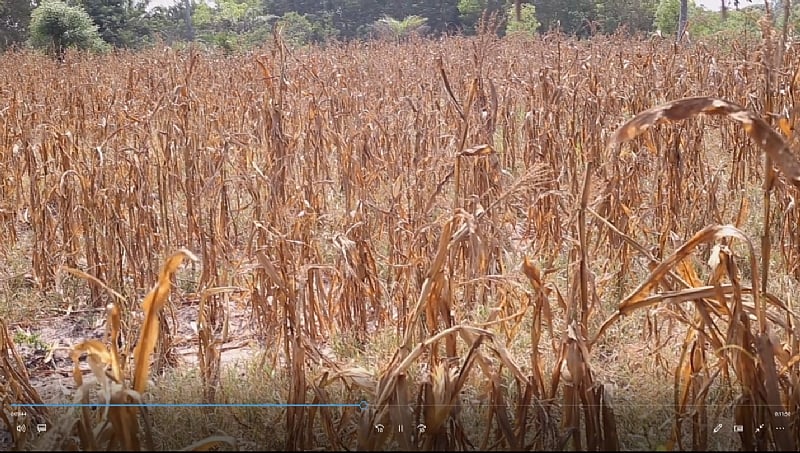In the Akatsi South Municipality of Ghana’s Volta Region, a creeping crisis unfolds as climate change reshapes the agricultural landscape, threatening the livelihoods of farmers who depend on the land for sustenance. Edem Akuaku, a young farmer with ambitious plans for his 90-acre maize field and extensive pineapple and rice crops, and Dofui, a 59-year-old disabled mother of four who cultivates a modest 5-acre maize plot, both find their hopes and dreams drying up along with their crops in the face of an increasingly erratic and unforgiving climate. The year began with the usual anticipation of rain, a lifeblood for their farms, but instead, the rains failed to materialize, ushering in a devastating drought that withered crops and left the community grappling with unprecedented challenges.
Dofui, a seasoned farmer with decades of experience reading the land’s rhythms, witnessed a disturbing shift. The predictable rainfall patterns she had relied on throughout her farming life became erratic, leaving her maize crop parched and unproductive. Lacking resources for pesticides and fertilizers, Dofui watched helplessly as her once-bountiful field succumbed to the relentless sun. Her five acres represented not just income, but food security and survival, leaving her in despair as she contemplated an uncertain future. Edem, facing the same relentless drought, experienced a more widespread devastation. His expansive maize, pineapple, and rice fields withered under the scorching sun, the cracked earth a stark testament to the severity of the drought. The hardship extended beyond crops to his livestock – cattle, goats, and pigs – as he struggled to procure expensive feed to compensate for the lack of grazing pastures. The rising costs of water and feed further compounded his struggles, draining his resources and leaving him with a sense of powerlessness against the forces of nature.
The plight of Edem and Dofui is a reflection of the broader crisis gripping the Akatsi South Municipality. Climate change has become a shared adversary, disrupting the traditional farming practices and threatening the community’s very way of life. The unpredictable rainfall patterns have eroded the foundation of agriculture in the region, leaving farmers facing mounting uncertainties and dwindling hope. The once-reliable cycles of planting and harvesting have become a gamble against an increasingly unpredictable climate, creating not just economic hardship, but a profound sense of loss and anxiety about the future. The changing climate has transformed the act of farming from a predictable rhythm of seasons into a struggle for survival.
Despite the overwhelming challenges, Edem and Dofui embody the resilience of their community, refusing to surrender to despair. Dofui, though heartbroken by the loss of her maize crop, explores the possibility of planting drought-resistant varieties, clinging to the hope of adapting to the changing conditions. Edem, equally determined, investigates climate-smart farming techniques, including rainwater harvesting, mulching to conserve soil moisture, and crop diversification to mitigate future risks. Their proactive approach reflects a spirit of adaptation and a determination to learn new strategies in the face of change. They recognize that while they cannot control the weather, they can adapt their methods and seek knowledge to navigate the challenges ahead.
Their efforts, however, are not without limitations. Both farmers acknowledge the need for external support – from the government and agricultural organizations – to effectively combat the impacts of climate change. Access to resources such as improved irrigation systems, financial assistance during droughts, and climate-resilient crop varieties are crucial for their survival and the future of farming in the region. They recognize that their individual struggles represent a collective crisis and call for collective action. Their appeals emphasize not just their own immediate needs, but the long-term implications for future generations who will inherit the land and face the consequences of climate inaction.
The stories of Edem and Dofui are emblematic of the broader narrative of climate change impacting vulnerable agricultural communities worldwide. Their experiences underscore the interconnectedness of climate change, food security, and economic stability, highlighting the urgent need for adaptive strategies and supportive policies. Their resilience in the face of adversity is a testament to the human spirit, but it also serves as a call to action. The battle against climate change in Akatsi South is not just a fight for crops and livelihoods, but a fight for the future of the community and the preservation of a way of life deeply rooted in the land. The plight of these farmers highlights the importance of global collaboration and support for climate-vulnerable communities, emphasizing that adaptation and resilience are not just local challenges, but shared responsibilities in a changing world.


